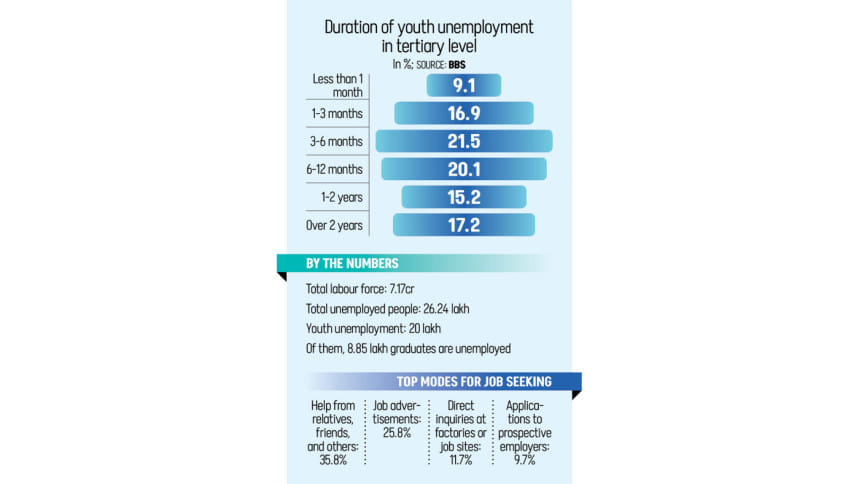Originally posted in The Daily Star on 29 September 2025
One in three graduates remains jobless for up to 2yrs

One in three university graduates remained unemployed for up to two years while looking for work last year. Of them, one in seven had been without work for between one and two years.
In the next category, one in six graduates had been jobless for more than two years.
The findings come from the Labour Force Survey conducted by the Bangladesh Bureau of Statistics (BBS). The state agency released the report this month.
Employment experts have termed one-third of graduates remaining jobless a serious concern. They say long-term unemployment can create a “scarring effect” on the careers of young people. Those starting jobs with a lag of one to two years are likely to remain behind throughout their career.
According to the Labour Force Survey report, there were 26.24 lakh unemployed people in 2024, including 8.85 lakh university graduates.
In the report, BBS detailed how jobseekers searched for work and the overall state of the labour market.
According to the report, nearly 36 percent of unemployed young people relied mainly on relatives and friends for help finding a job, while 26 percent applied through advertisements.
About 12 percent approached organisations in person and 9 percent sent applications directly to institutions. Another 5.5 percent said they decided whether to apply only after seeing advertisements, while 3.5 percent tried to get work through walk-in interviews.
“This is called long-term unemployment. Even after six months, it becomes a matter of concern,” said Rizwanul Islam, former special adviser for the Employment Sector at the International Labour Office in Geneva.
“This is a clear waste of talent and assets. In terms of education, training, and society, what we call ‘misallocation of resources’ or ‘underutilisation of skills’ is a much more serious problem in the long term,” he said.
“Unemployment also tends to persist as people move from one job to another. The structure of job transition itself contributes to long-term unemployment,” said Islam.
Asked about job search methods, he said one factor was the lack of formal mechanisms in society.
“Previously, formal mechanisms existed, such as newspaper advertisements or organisational announcements. Today, most job searches have shifted to online platforms, increasing dependence on informal networking,” he added.
Badrun Nessa Ahmed, senior research fellow at the Bangladesh Institute of Development Studies (BIDS), also cited poor quality of education and shortages of trained teachers.
“For graduates, quality matters a lot, and quality really makes a difference,” she said, referring to a BIDS study on graduates from National University-affiliated colleges.
The study found that around 28 percent of graduates remained unemployed, compared to about 17-18 percent in comparable government data.
Referring to the joblessness among graduates, Fahmida Khatun, executive director of local think tank Centre for Policy Dialogue (CPD), said, “This reflects a harsh reality in our economy.”
This is because there is not adequate investment for job creation in our economy, she said.
The economist said employment opportunities are mainly created through private-sector investment. But that has been stagnant for around a decade.
“More recently, investment has been decreasing even further, and most private-sector investment is foreign in nature. As a result, opportunities for job creation are extremely limited,” said Fahmida.
She said, “Graduates coming out of universities and other tertiary institutions often cannot fill the available positions because their qualifications, skills, and quality do not meet market demands.”
“There is a significant skills gap, a mismatch between what the market requires and what the graduates possess. Many have certificates but lack quality education or courses aligned with market needs.”
Due to this skills mismatch, even the few employment opportunities that exist are not being fully utilised, she added.
In the past, for some jobs, personnel had to be brought in from abroad. The combination of limited investment and poor-quality skills has caused highly educated unemployment to rise.
“The higher the education level, the lower the chances of getting a job quickly. Those with HSC or SSC often find jobs faster, while undergraduates and master’s graduates face longer waits.”
Many highly educated individuals wait for Bangladesh Civil Service (BCS) jobs or other government posts. With fewer positions available, their unemployment rate is higher, whereas less educated individuals are more likely to secure available jobs, she added.
According to BBS, a person is considered unemployed if they did not work at all during the previous week, even for an hour, or were temporarily absent from work, and if they are currently available for employment or have sought work or tried to start a business or farm in the previous four weeks.
In Bangladesh, surviving on one hour of work a week is effectively impossible. In addition, nearly one crore people who are unable to find their preferred type of work are classified as underemployed or disguised unemployed.


